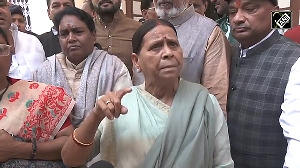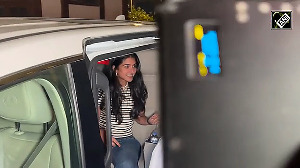FIA president Max Mosley says Formula One is healthier than it has been for more than a decade.
Even if the initial reaction is to suspect a clever strategem, yet another move in a long-running political game involving lots of money and control of the glamour sport, the Briton has a point.
That is not to brush aside the problems, of course.
Formula One is deeply divided with a group of carmakers still talking about setting up their own 'rival series' from 2008 while world champions Ferrari have been isolated by the other nine teams.
Commercial supremo Bernie Ecclestone is 74, with no heir-apparent and a series of court battles on the horizon between his businesses and the shareholder banks who own 75 percent of holding company SLEC.
Meanwhile Mosley's term in office expires this year and the Briton has yet to say whether he will stand for re-election, although many suspect he will.
The question of cigarette sponsorship, striking a jarring note when it comes to talking about the health of a sport, and an imminent European Union ban on tobacco advertising is another issue to be resolved.
There is every reason to expect the season starting in Melbourne on March 6 to be fractious, with bickering going on for months.
"It (Mosley's assertion) is a very superficial view and really designed to deflect the fact that he's going to come under enormous pressure," said one team source who did not want to be identified.
Yet there is also a genuine sense of optimism.
REAL OPTIMISM
"In terms of the health of the 10 teams lining up in Melbourne, he is probably right," said another source.
"There have never been more manufacturers or more sponsors and even Paul Stoddart feels Minardi's future looks reasonably bright. There's nobody going into this season wondering if they will see it out."
That could not be said last year, when there was a serious possibility that three of the sport's 10 teams could fold with potentially disastrous consequences.
Since then, Jaguar has been sold to Austrian billionaire Dietrich Mateschitz and renamed Red Bull. Jordan has been taken over by Russian-born Canadian businessman Alex Shnaider and will be renamed Midland next year.
BAR's position has been strengthened by Honda buying a 45 percent stake in the team from British American Tobacco and hinting it is willing to take over entirely in the future.
Champions Ferrari, to the fury of other carmakers, have turned their backs on a rival series and agreed to stay with Ecclestone and the FIA until 2012 in exchange for at least $100 million.
The risk, referred to this week by team boss Jean Todt, of the cost of competing forcing Ferrari to pull out of Formula One has definitely receded if indeed it was ever a serious consideration.
Teams can also assume that, whatever happens after the existing Concorde Agreement expires at the end of 2007, they will get a far greater share of the revenues even if details are sketchy.
QUESTION MARK
Dangers do remain, however, and until the long-term future of the sport is clarified, there will be a big question mark hanging over Formula One.
"The imminent collapse of teams has gone away," said a team source. "But if we carry on spending at the same rate, in two years' time we will be back in the same place. The problem hasn't gone away."
Manufacturers are in Formula One for commercial reasons and can always decide, like Ford did last year, that they no longer want to be part of the show.
There is the risk, minimised by Mosley and many others who do not believe it will ever happen, that Formula One could split in two from 2008 with disastrous consequences.
And then there is the entertainment factor.
Formula One has had the same team winning the constructors' championship for the last six years and the same driver for the past five.
If Ferrari romp away again this season, with Michael Schumacher winning race after race, Formula One will still have a fight on its hands for hearts and minds.
'Healthier' does not mean the patient is out of danger.








 © 2025
© 2025